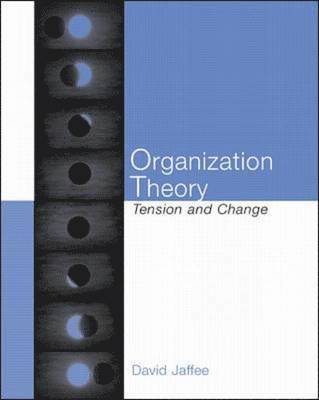
Fler böcker inom
- Format
- Häftad (Paperback)
- Språk
- Engelska
- Antal sidor
- 336
- Utgivningsdatum
- 2000-08-01
- Upplaga
- illustrated ed
- Förlag
- McGraw-Hill Higher Education
- Illustrationer
- Illustrations
- Dimensioner
- 235 x 164 x 14 mm
- Vikt
- Antal komponenter
- 1
- ISBN
- 9780072341669
- 380 g
Organization Theory: Tension and Change
Häftad,
Engelska, 2000-08-01
Slutsåld
Kundrecensioner
Har du läst boken?
Sätt ditt betyg »
Fler böcker av David Jaffee
-
Organizational Theory: Tension and Change
David Jaffee
-
Levels of Socio-economic Development Theory
David Jaffee
Övrig information
David Jaffee received his B.A. from University of Florida and his M.A. from Washington University in St.Louis, both in Political Science. He received his Ph.D. in Sociology from University of Massachusetts at Amherst. Jaffee has published articles on a variety of topics including international development, gender inequality, industrial location, organization theory, and instructional technology. He is the author of Levels of Socio-Economic Development Theory (Praeger, 1998). He is currently an associate professor of sociology at the University of North Florida.
Innehållsförteckning
ORGANIZATION THEORY: TENSION AND CHANGE
1. INTRODUCTION: DEFINITIONS AND CONCEPTIONS
Organization: Elements, A Definition and Images
W. Richard Scotts Elements of Organization
Richard Hall's Definition of Organization
Gareth Morgan's Images of Organization
Classical Social Theory and Organizational Analysis
Karl Marx
Emile Durkheim
Max Weber
Contemporary Social Theory and Organizational Analysis
Structural Functionalism
Conflict Theory
Symbolic Interactionism
Summary
2. CONCEPTUAL FRAMEWORK FOR THE ANALYSIS OF ORGANIZATION THEORY
Levels of Organizational Analysis and Transaction
Tension #1: Controlling The Human Factor
Organizational Behavior and the Human Factor
Marxist Theory and the Unique Nature of Labor
Philosophical Status of the Human Factor
The Human Factor and the Reformulation of Organization Theory and Management Practice
Tension #2: Differentiation and Integration
The Technical Division of Labor: Intraorganizational Dynamics
The Social Division of Labor: Interorganizational Dynamics
A Note on Organizational Tensions and Ascribed Characteristics
Paradox: The Underlying Source of Organizational Tension
Models of Organizational Paradox
Three Cases of Organizational Paradox
Summary
3. THE RISE OF THE FACTORY SYSTEM
Introduction
The Formal Subordination of Labor: Creating A Human Factor of Production
The Real Subordination of Labor: Disciplining the Human Factor
Traditional Habits and Cultures
Early Strategies and Assumptions
Scientific Management in Theory
Motivation for the Theory
The Principles and Stages
Assessment and Consequences
Scientific Management in Practice: The Hoxie Study
Scientific Management: The Broader Context
Summary
4. THE HUMAN ORGANIZATION
The Hawthorne Revelations and Beyond
The Hawthorne Experiments: The Human Factor Observed
Interpeting the Results
Hawthorne and the Revision of Organization Theory
Roethlisberger and Dickson
Elton Mayo
Chesters World: Barnards Theory of Organization and Management
The Organization and the Individual
Common Moral Purpose
Humanistic Management Practice
Human Relations and Human Needs
From Human Relations to Human Resources
Leadership
Beyond Legitimate Authority
Four Approaches to Leadership
Does Leadership Matter?
Summary
5. BUREAUCRACY, RATIONALIZATION, AND ORGANIZATION THEORY
Weber and the Rational-Bureaucratic Model
Weber and the Dilemma of Authority
Bureaucratic Dysfunctions and Unintended Consequences
Robert Merton: The Bureaucratic Personality
Alvin Gouldner: Patterns of Industrial Bureaucr...
Du kanske gillar
-
Peak Human
Johan Norberg
Häftad -
Peak Human
Johan Norberg
Inbunden
